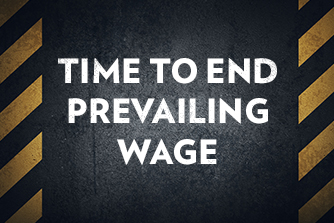Media

More States Reject Prevailing Wage Mandates
Last month, Michigan took a step forward and joined 24 other states that have no prevailing wage law. Could Pennsylvania be the next?
For far too long, Pennsylvania’s prevailing wage law has crippled productivity, wasted taxpayer dollars, and discouraged healthy competition. Vowing to protect local workers, the law requires the government to pay workers a set rate for projects over $25,000.
It sounds nice, until you realize how much money is wasted.
Take East Stroudsburg University, for example. As a state school, the university was required to pay workers a prevailing wage that far exceeded the state average on similar projects. According to Allegheny Institute,
Painters on the university projects were paid 64 percent more than the state average wage for painters and laborers were paid 25 percent more than the state average.
This is especially alarming considering the poor fiscal shape of Pennsylvania's state school system that just announced a nearly three percent tuition hike.
In addition to wasting taxpayer dollars, the prevailing wage law also limits the number of projects a government can complete. That means less road paving, infrastructure projects and school building maintenance. According to the Allegheny Institute, “If projects are unnecessarily expensive, government [at] both the local and state level will be unable to carry out as many projects as they would in the absence of the extra expense created by prevailing wages.”
Pennsylvania would do well to drop the prevailing wage law and let local governments negotiate fair rates that reflect the market.
Not sure if it will work? Consider Michigan, whose legislators estimate $400 million in savings per year after repealing their prevailing wage law. In Ohio, legislators made prevailing wages optional and saw schools save almost $500 million. Despite paying workers the state average instead of prevailing wage, 91 percent of surveyed school districts said construction was of the same quality.
It’s time for Pennsylvania to end this harmful and unfair government mandate that's holding back our schools and local governments.